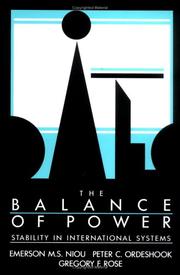| Listing 1 - 2 of 2 |
Sort by
|

ISBN: 0521374715 0521376157 0511664281 Year: 1989 Publisher: Cambridge New York Sydney University Press
Abstract | Keywords | Export | Availability | Bookmark
 Loading...
Loading...Choose an application
- Reference Manager
- EndNote
- RefWorks (Direct export to RefWorks)
One of the fundamental issues of international relations concerns whether, and under what conditions, stability prevails in anarchic systems, these being systems in which all authority and institutional restraints to action are wholly endogenous. This book uses the tools of game theory to develop a comprehensive theory of such systems and details both necessary and sufficient conditions for stability. The authors first define two forms of stability: system and resource stability. International political systems are said to be stable when no state confronts the possibility of a loss of sovereignty. Resource stability, in contrast, requires that the current distribution of wealth and power among states can change only due to differences in the vitality of economies. The theory developed in this book refines the classic balance-of-power theory and formally incorporates into that theory the consideration of endogenous resource growth, preventive war, war costs and the imperatives of geography, revealing a fundamental conflict between the concepts of 'balancers' and 'central powers'.
Balance of power --- Social Sciences --- Political Science --- Political stability --- Mathematical models. --- Power, Balance of --- Power politics --- International relations --- Political realism --- Destabilization (Political science) --- Political instability --- Stability, Political --- Consensus (Social sciences) --- Legitimacy of governments
Book
Year: 2006 Publisher: Cambridge ; New York (N.Y.) : Cambridge university press,
Abstract | Keywords | Export | Availability | Bookmark
 Loading...
Loading...Choose an application
- Reference Manager
- EndNote
- RefWorks (Direct export to RefWorks)
One of the fundamental issues of international relations concerns whether, and under what conditions, stability prevails in anarchic systems--systems in which all authority and institutional restraints to action are wholly endogenous. This book uses the tools provided by contemporary game theory to develop a comprehensive theory of such systems and details both necessary and sufficient conditions for stability. The authors first define two forms of stability--system and resource stability. International political systems are said to be stable when no state confronts the possibility of a loss of sovereignty. Resource stability, in contrast, requires that the current distribution of wealth and power among states can change only due to differences in the vitality of economics. The theory developed in this book refines the classic balance of power theory and formally incorporates into that theory the consideration of endogenous resource growth, preventive war, war costs, and the imperatives of geography, revealing a fundamental conflict between the concepts of "balancers" and "central powers."
Balance of power --- Political stability --- Mathematical models.
| Listing 1 - 2 of 2 |
Sort by
|

 Search
Search Feedback
Feedback About UniCat
About UniCat  Help
Help News
News